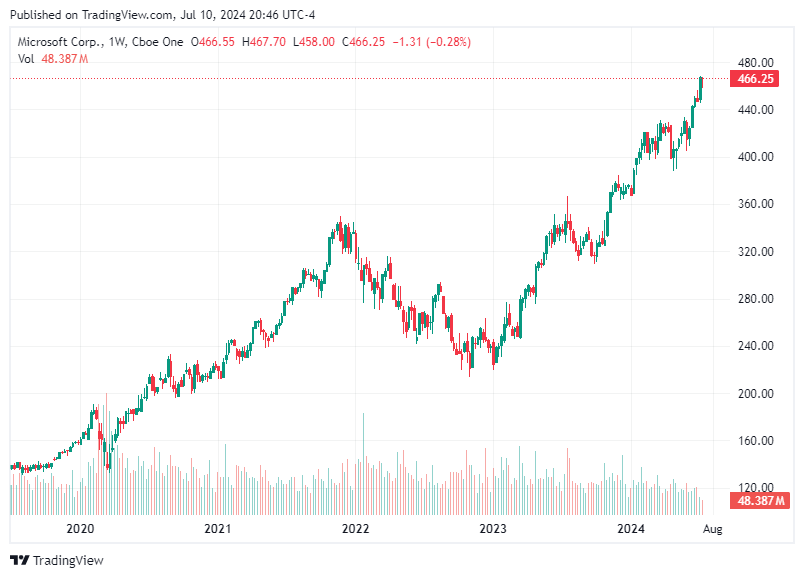Apple and Microsoft Leave OpenAI Board Seats Over Regulatory Concerns
Microsoft and Apple Leave OpenAI Board Seats Amid Regulatory Scrutiny.

Disclaimer: The following article aims to provide a detailed, neutral account of recent events involving Microsoft, Apple, and OpenAI. It does not serve as an endorsement or criticism of any company, entity, or regulatory body mentioned herein.
Real-time information is available daily at https://stockregion.net
Both Microsoft and Apple have decided to relinquish their observer seats on OpenAI's board. This decision comes amidst increasing regulatory scrutiny concerning the relationships between big tech companies and artificial intelligence (AI) startups.
Microsoft, a prominent financial backer of OpenAI, and Apple, which was set to place one of its executives in a similar role, have retracted their positions from OpenAI's board. This action is symptomatic of broader regulatory concerns about how alliances between technology firms and AI startups could exert undue influence and affect market competition. Microsoft's decision to step down from its observer seat on the OpenAI board was made official through a letter to the startup, first reported by the Financial Times. The resignation from this non-voting position was declared "effective immediately."
Microsoft, which has invested approximately $13 billion in OpenAI, cited the substantial progress made by the new board of OpenAI as a reason for its decision. The reformed board came into existence following the dramatic sacking and reinstatement of Sam Altman, the chief executive of OpenAI, last year. According to Microsoft, the new board has shown a strong commitment to safety and building a robust organizational culture, eliminating the need for Microsoft's limited role as an observer. It is understood that Microsoft's departure from the observer role was also influenced by regulatory concerns. In the United Kingdom, the Competition and Markets Authority (CMA) is examining whether Microsoft's partnership with OpenAI might lead to "an acquisition of control." Simultaneously, the Federal Trade Commission (FTC) in the United States is also scrutinizing the partnership.
Similarly, Apple will no longer be able to appoint an executive to a board observer role at OpenAI. Reports suggested that Apple intended to place Phil Schiller, head of its App Store, in this position as part of an agreement announced in June. However, this plan has been shelved under the new approach adopted by OpenAI, which now excludes having board observers.
Regulatory Scrutiny and Its Implications
The scrutiny of these investments and partnerships is part of a larger trend wherein regulatory bodies are increasingly vigilant about the implications of collaborations between big tech companies and AI startups. While the European Commission has chosen not to carry out a formal merger review into Microsoft's investment in OpenAI, it is investigating the exclusivity clauses present in the agreement between the two companies. In the United States, the FTC is also examining similar tie-ups, particularly those involving Anthropic, another AI startup behind the Claude chatbot, and its associations with Google and Amazon. The UK’s CMA is likewise reviewing Amazon and Anthropic’s partnership along with Microsoft's alliances with Mistral and Inflection AI.
In response to the withdrawal of board observers, OpenAI is pioneering a new method of engaging with its key partners, including Microsoft, Apple, and other financial investors. A spokesperson from OpenAI indicated that the startup is instituting regular stakeholder meetings to share updates on their mission and foster stronger collaboration in areas such as safety and security.
"We look forward to continuing to receive feedback and advice from these key stakeholders," the spokesperson said.
Expert Opinions
Alex Haffner, a partner at the UK law firm Fladgate, commented on the situation, suggesting that Microsoft's decision is likely influenced by the current regulatory environment. Haffner noted that regulators are closely examining the intricate relationships that major technology firms have established with AI providers. He emphasized the necessity for companies like Microsoft to reconsider how they structure their partnerships moving forward.
The decisions by Microsoft and Apple to step back from direct observational roles in OpenAI may signify a broader shift within the technology sector in response to intensifying regulatory oversight. These developments could prompt other large tech companies to reassess their relationships and strategies in partnering with AI startups. The heightened scrutiny from regulators is aimed at ensuring these partnerships do not stifle competition or create monopolistic practices. By stepping down from these influential observer roles, Microsoft and Apple appear to be taking preemptive measures to mitigate potential regulatory repercussions that could arise from perceived conflicts of interest or control over emerging AI technologies.
The relinquishment of observer seats by Microsoft and Apple on OpenAI's board reflects a cautious approach in light of mounting regulatory scrutiny. As regulatory bodies around the world continue to assess the impact of major tech companies' investments in AI startups, the dynamics of these partnerships are likely to evolve.
OpenAI's initiative to engage with partners through regular stakeholder meetings without board observers marks a new chapter in how such collaborations are managed. This approach aims to balance the need for oversight and guidance with the imperative to maintain competitive fairness and innovation within the AI industry.
Disclaimer: The content of this article is intended for informational purposes only. The views and opinions expressed herein are those of the original sources and do not necessarily reflect the official policy or position of any company or organization mentioned.
Real-time information is available daily at https://stockregion.net


